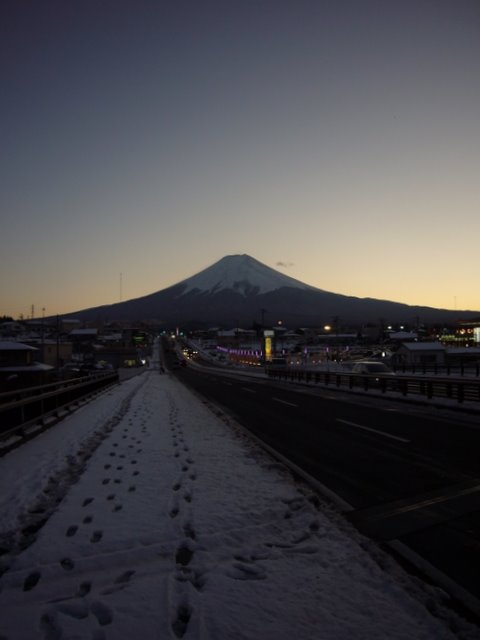
'Ginga' ('Galaxy') is the last single of 'four-season single disks' released in February 2005. It is one of the most popular masterpieces of Fujifabric and audience always get so excited when performed in a concert. 'Kurofuku no Hito' ('A Man In A Black Suit') is a song coupled with 'Ginga' in the single CD.
Some of you might have heard in an album called 'B Men Syu' (This album consists of only the songs coupled with released singles) for the first time, and it is my opinion that winter-like charm and atmosphere are well expressed in this song. As usual, this song is worth being a single.
All ages and places, 'death' is one of the issues which has been dealt with in rock music, but there are no other songs which beautifully describe the winter scenery, and calmly consider the transience of life and unavoidable separation with the love ones not in a dreary way.
This is the moment that we realise Mr. Shimura is a genius for music.
(This is a mourning dress in Japanese style that a Japanese lady wears in a funeral.)
Mediocrity words, like 'a mourning dress', are not at all used, but 'men in black suits lining up' implies a funeral and makes us think, "Wait, is this song about a funeral?". The phrase, 'your photo in a smile' 'crying' , define that this is really a song about a funeral. A man in a black suit can be a man in a black or a white tie, or even gangsters (like in a film!), but the scenery of a funeral in winter clearly emerges in your mind by listening to the melody with lyrics in the first part.
A funeral on a cold cold winter day like 'giving a send-off to the motor hearse snow falls and lays on the rut on the road'.
After singing the description of how the funeral was undertaken in a quiet tone, here comes 'even going far away I will never forget after years pass by I will never forget' - the simple words with strong will expressing deep grief.
Mr. Shimura said in an interview somewhere that "this is the song that I wrote being inspired by the funeral of my own grandfather", I remember. There is a post in the diary in his book, "Tokyo, Music and Rock'n Roll", but the one sung in the song must be another grandfather on a different side as it is dated in May.

(This is a pocket that bank notes as monetary offering is put in, on an occasion of a funeral. It is called "Koden Bukuro".)
The procedures of ceremonies, such as a wedding and a funeral, are in diverse depending on areas. In Fujiyoshida City, where Mr. Shimura is from, there is a unique custom. In a funeral, attendants bring the cash without putting in a black and white pocket, and pay at so-called "a cashier" which is placed at the entrance. At this time, if you do not have a correct amount of cash that you wish to offer, you tell so to a person at the cashier, then you can receive a change.
It is very unique as not being found in other area in Yamanashi Prefecture. It can be a common custom in Gunnai Area (Fujiyoshida City, Uenohara City, Tsuru City), but not for sure.
An interesting anthropological study can be done on this topic, I'm sure.
In Japan and the West, black is the icon colour for mourn, but in Thai Chinese society, white is the colour of grief. Close relatives wear all in white and attend the funeral. Strangely, they wear in black to attend funerals of the others though. On the other hand, black should not be worn in a celebration like a wedding as a taboo colour. In some areas in Okinawa, light blue is used in a funeral.
Birth and Death are something which cannot be separated from our life, so it is surely natural that features of a region is well expressed through ceremonies in such occasions.

Mr. Shimura's voice sometimes sounds bluntly in 'Kurofuku No Hito' ('A Man In A Black Suit).
His voice effectively brings us up the scenery of the funeral held at the corner in a cold cold town, and it conveys a deep grief.
Towards the end of the song, the beep beep beep sound of the synthesizer gradually slows down and keeps beeping at the really end. It reminds me the sound of an electrocardiography.
Even though there are many fans of Fujifabric's who cannot listen to this song yet after the Mr. Shimura passed away last Christmas Eve, this song remains as one of the good songs in Japanese music history.
Enjoy listening to 'Kurofuku No Hito' by Fujifabric.

No comments:
Post a Comment